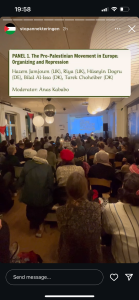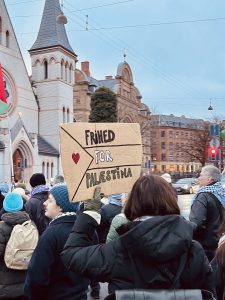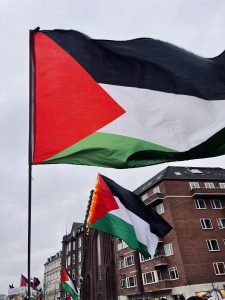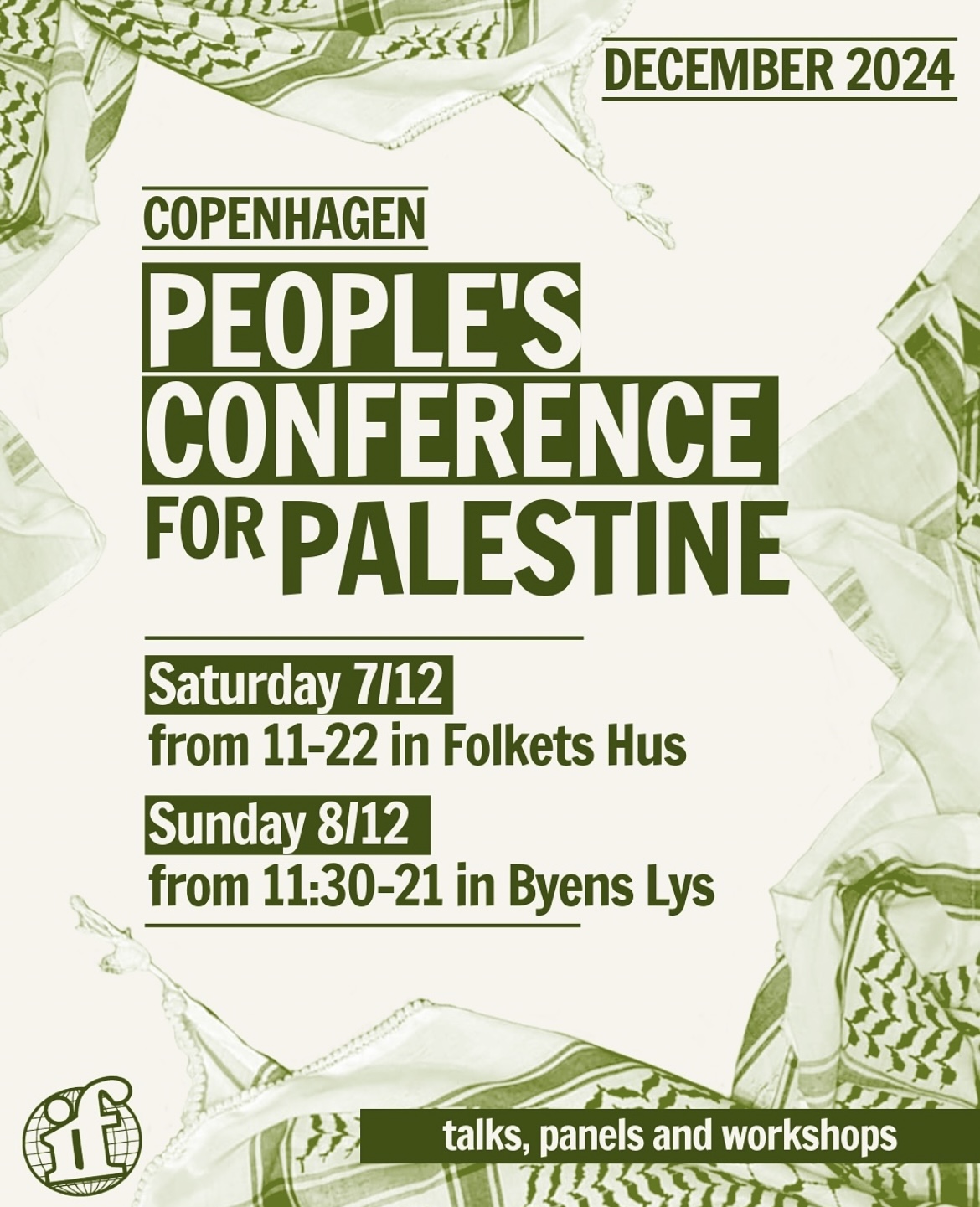Hey Reader,
I hope things are well in your world right now. I’ve been looking forward to writing up this post following my attendance at the People’s Conference for Palestine, organised by the IF (International Forum) Palestine, which took place across two days on December 7th and 8th earlier this month.
The conference featured talks, panel discussions, workshops with local and international speakers and activists, community kitchen, film screenings, and conversations, and was a gathering of activists, scholars, policymakers, and organisations focused on discussing and advocating for Palestinian rights and the broader Palestinian struggle for justice, self-determination, and an end to the Israeli occupation and the on-going genocide in Gaza.
The conference was designed provide a platform for grassroots movements, solidarity groups, and others involved in advocating for Palestinian rights, to collaborate, share strategies, and amplify their voices.
I attended a few of the events but wanted to blog about the panel discussion I found most interesting in terms of the panel representation, which included activists from the UK, as well as a German/Turkish journalist from Red Media and a representative of the student movement here in Copenhagen.
Panel Discussion – The Pro-Palestinian Movement in Europe: Organising and Repression

One of the most compelling discussions revolved around the panel titled “The Pro-Palestinian Movement in Europe: Organising and Repression”. Below I’ve summarised some of the key takeaways from this vibrant and thought-provoking session:
Unified Demands and Grassroots Mobilisation
The panel began by emphasizing the importance of clear, unified demands to drive the movement forward. The initial demands included:
1. An immediate ceasefire in Gaza.
2. Unconditional humanitarian aid into Gaza.
These demands are vital, not just for their moral urgency but also as rallying points to galvanize widespread support. The pro-Palestinian movement has worked tirelessly to amplify its voice by scaling up demonstrations to three times a week. Beyond protests, the movement has diversified its activities, incorporating cultural events such as art exhibits, poetry readings, and music performances to maintain engagement and foster solidarity.
Once a month, larger demonstrations bring together activists from across Denmark and Southern Sweden. These events serve as unifying moments for the movement, reinforcing its resilience and consistency. However, despite these efforts, policy changes remain elusive. The speakers highlighted how Denmark’s government often echoes U.S. foreign policy, amplifying its imperialist agenda. Statements from Danish officials frequently mirrored those of U.S. President Joe Biden, illustrating a troubling alignment that undermines grassroots demands for justice.
Activists stressed that real change requires grassroots tools and strategies that challenge entrenched state interests. It’s not enough to demand change; the movement must also build the structures necessary to achieve it.


Diversity and Strength in Unity
One of the movement’s notable strengths has been its inclusivity. Participants from all walks of life, including minority groups and the LGBTQ+ community, have come together to rally behind additional demands, such as ending the siege on Gaza, initiating a prisoner exchange, and imposing an arms embargo on Israel. This diversity has fostered a broad coalition capable of sustaining the movement despite repression and limited media coverage.
The panelists also addressed the critical question of representation, asking what it means when governments consistently ignore mass movements. As one speaker poignantly remarked, “Scratch a liberal, and a fascist bleeds.” This sentiment underscored the need to redefine engagement with political systems and focus on grassroots organising rather than mere mobilisation. When representative governments fail to act, the power of a unified, diverse movement becomes even more critical.
Mobilising vs Organising
A central theme of the discussion was the distinction between mobilisation and organising. While mobilisation involves rallying large numbers of people, organising is a slower, more deliberate process that requires clear strategies and tactics. The panel critiqued the global pro-Palestinian movement for being well-mobilised but poorly organised, which has limited its impact.
Key questions emerged: How do we translate anger on the streets into a cohesive movement? How can the Palestine solidarity movement align with other liberation movements to build a unified front against oppression? These questions underscore the need for strategic thinking and long-term planning to sustain the movement’s momentum.
Challenges in a Repressive Climate
The panel did not shy away from addressing the increasing repression faced by pro-Palestinian activists. From biased media coverage to legal obstacles like the EU’s Digital Services Act, which enables states to suppress content in “emergencies,” the challenges are mounting. Activists noted that traditional and social media platforms remain heavily influenced by global capital, often limiting how effectively the movement can communicate its message.
For instance, many activists have faced content suppression on platforms like Instagram and Twitter, especially during peak moments of visibility. Despite these barriers, the movement has found creative ways to amplify its voice, for example people can email speeches or poems, which can then presented at demonstrations, ensuring a wide range of voices could be heard.
Lessons from Other Movements
The conference also drew lessons from student movements and labour unions. For instance, university campaigns have successfully pressured institutions to divest from companies like Airbnb and Booking.com, which have ties to the Israeli occupation. These victories demonstrate the potential for targeted, strategic actions within specific sectors. However, these successes often come with risks, as activists frequently face backlash from right-wing political blocs and institutional resistance.
In Germany, the pro-Palestinian movement has experienced brutal crackdowns. Nevertheless, organisers there are learning to return stronger and more focused, aligning with diverse voices, including Jewish and LGBTQ+ activists, to connect intersectional struggles. One German journalist at a demonstration remarked that the events in Copenhagen seemed less dramatic compared to the brutal responses in Germany, but this contrast just goes to highlight the importance of consistency and resilience in the face of repression.
Moving Forward
The panel concluded with a call to action. The ceasefire movement, they stressed, is not the end goal; a free Palestine must remain the ultimate objective. To achieve this, activists must:
• Build power within class-based struggles.
• Align with liberation movements rather than relying on states or institutions.
• Focus on effective, rather than symbolic, actions.
The speakers also urged the movement to remain wary of performative activism. As one panelist warned, “Don’t mistake emotion for action.” True solidarity requires sustained, strategic efforts that go beyond symbolic gestures. It also means recognising the interconnectedness of struggles against capitalism, imperialism, and other systems of oppression.
A key focus moving forward will be on organising intersectionally to build broader consensus and alliances. This includes bringing the Palestinian struggle into other political spaces, such as climate justice, racial equity, and economic justice movements. The panel highlighted the importance of student movements, which have already made significant strides, and called for continued engagement with labour unions and other grassroots organisations.
As one speaker aptly put it, “I’m objective, but I’m not neutral. To free Palestine, I have to fight the capitalist imperialist system.” This sentiment captured the essence of the conference—a passionate, strategic effort to challenge injustice and build a better future for Palestine and beyond.
Personal Reflection
As a supporter of the pro-Palestinian movement, attending the People’s Conference for Palestine was both inspiring and sobering. The collective energy in the room was palpable, a testament to the strength of the global solidarity movement. Yet, I couldn’t help but feel the weight of the challenges we face. From government indifference to media suppression, the path to a free Palestine feels daunting at times. But what stood out most was the resilience and creativity of the activists. Hearing about the diversity within the movement, including voices from minority groups, reminded me of the universal nature of the struggle for justice. It reinforced my belief that the fight for Palestine is not just about a single nation or group of people—it’s a fight against systemic oppression everywhere.
The conference also pushed me to reflect on my own role and how I am not doing enough. What more can I be doing, and how can I better align my efforts with broader liberation movements? These are questions I’ll carry with me as I continue to advocate for a free Palestine. Above all, the event underscored the power of people coming together, even in the face of overwhelming odds. It reminded me that while governments may fail us, the strength of grassroots solidarity can achieve great things. As one speaker said, “Even if we’re weak, we must still come out on the streets.” It’s this spirit that gives me hope for the future.
The People’s Conference for Palestine was a powerful reminder that change begins with the people. Through unity, strategy, and resilience, the pro-Palestinian movement in Europe continues to shine a light on the path to justice. It’s a long road, but with sustained effort and solidarity, the dream of a free Palestine remains alive.
